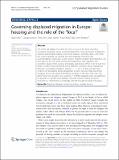Files in this item
Governing displaced migration in Europe : housing and the role of the “local”
Item metadata
| dc.contributor.author | Meer, Nasar | |
| dc.contributor.author | DiMaio, Claudio | |
| dc.contributor.author | Hill, Emma | |
| dc.contributor.author | Angeli, Maria | |
| dc.contributor.author | Olberg, Klara | |
| dc.contributor.author | Emilsson, Henrik | |
| dc.date.accessioned | 2021-08-19T16:30:13Z | |
| dc.date.available | 2021-08-19T16:30:13Z | |
| dc.date.issued | 2021-01-25 | |
| dc.identifier | 275502467 | |
| dc.identifier | d159d52d-5159-4ba5-8e5c-8e1f3269808e | |
| dc.identifier | 85099971601 | |
| dc.identifier.citation | Meer , N , DiMaio , C , Hill , E , Angeli , M , Olberg , K & Emilsson , H 2021 , ' Governing displaced migration in Europe : housing and the role of the “local” ' , Comparative Migration Studies , vol. 9 , 2 . https://doi.org/10.1186/s40878-020-00209-x | en |
| dc.identifier.issn | 2214-594X | |
| dc.identifier.uri | https://hdl.handle.net/10023/23801 | |
| dc.description | The underlying research funding for this article comes from the Joint Programming Initiative Urban Europe, with support from the European Union’s Horizon 2020 Research and Innovation Programme under grant agreement No 693443. | en |
| dc.description.abstract | This article will explore the extent to which a focus on the ‘local’ can tell us something meaningful about recent developments in the governance of displaced migrants and refugees. Taking a multi-sited approach spanning cases in the south and north of Europe, we consider how the challenge of housing and accommodation in particular, a core sector of migrant reception and integration, can shed light on the ways local and city level approaches may negotiate, and sometimes diverge from, national level policy and rhetoric. While it can be said that despite variation, local authorities are by definition ultimately ‘always subordinate’ (Emilsson, Comparative Migration Studies, 3: 1-17, 2015: 4), they can also show evidence of ‘decoupling’ across geographies of policy delivery (Pope and Meyer, European Journal of Cultural and Political Sociology, 3: 280–305, 2016: 290). This article traces how possible local variations in different European cases are patterned by ground-level politics, local strategic networks, and pre-existing economic resources in a manner that is empirically detailed through the study of housing. | |
| dc.format.extent | 17 | |
| dc.format.extent | 522408 | |
| dc.language.iso | eng | |
| dc.relation.ispartof | Comparative Migration Studies | en |
| dc.subject | Migration | en |
| dc.subject | Refugees | en |
| dc.subject | Local | en |
| dc.subject | Governance | en |
| dc.subject | Housing | en |
| dc.subject | Europe | en |
| dc.subject | H Social Sciences (General) | en |
| dc.subject | 3rd-DAS | en |
| dc.subject | SDG 11 - Sustainable Cities and Communities | en |
| dc.subject | SDG 16 - Peace, Justice and Strong Institutions | en |
| dc.subject.lcc | H1 | en |
| dc.title | Governing displaced migration in Europe : housing and the role of the “local” | en |
| dc.type | Journal article | en |
| dc.contributor.institution | University of St Andrews. School of Geography & Sustainable Development | en |
| dc.identifier.doi | 10.1186/s40878-020-00209-x | |
| dc.description.status | Peer reviewed | en |
This item appears in the following Collection(s)
Items in the St Andrews Research Repository are protected by copyright, with all rights reserved, unless otherwise indicated.

